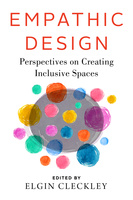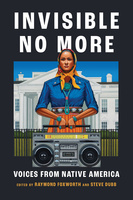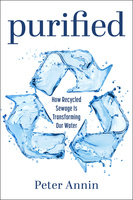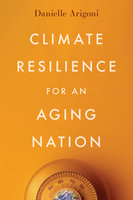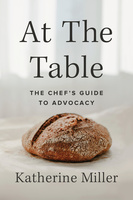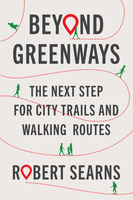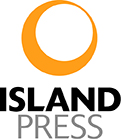
Island Press began with a simple idea: knowledge is power—the power to imagine a better future and find ways for getting us there. Founded in 1984, Island Press’ mission is to provide the best ideas and information to those seeking to understand and protect the environment and create solutions to its complex problems.
Empathic Design
Perspectives on Creating Inclusive Spaces
How do you experience a public space? Do you feel safe? Seen? Represented? The response to these questions may differ based on factors including your race, age, ethnicity, or gender identity. In Empathic Design, designer and architecture professor Elgin Cleckley brings together leaders and visionaries in architecture, urban design, planning, and design activism to explore what it means to design with empathy. Empathic designers work with and in the communities affected. They acknowledge the full history of a place and approach the lived experience and memories of those in the community with respect.
Contributors explore broader conceptual approaches and highlight design projects including the Harriet Tubman Memorial in Newark, which replaced a long-standing statue of Christopher Columbus; and restoration of the Freedom Center in Oklahoma City, first built by civil activist Clara Luper to provide a safe place for gathering and youth education; and The Camp Barker Memorial in Washington, D.C., which commemorates a “contraband camp” used to house former slaves who had been captured by the Union Army.
Empathic Design provides essential approaches and methods from multiple perspectives, meeting the needs of our time and holding space for readers to find themselves.
Invisible No More
Voices from Native America
Edited by Raymond Foxworth of the Henry Luce Foundation and Steve Dubb of The Nonprofit Quarterly, Invisible No More is a groundbreaking collection of stories by Native American leaders, many of them women, who are leading the way through cultural grounding and nation-building in the areas of community, environmental justice, and economic justice. While telling their stories, authors excavate the history and ongoing effects of genocide and colonialism, reminding readers how philanthropic wealth often stems from the theft of Native land and resources, as well as how major national parks such as Yosemite were “conserved” by forcibly expelling Native residents. At the same time, the authors detail ways that readers might imagine the world differently, presenting stories of Native community building that offer benefits for all.
People, Planet, Design
A Practical Guide to Realizing Architecture’s Potential
In People, Planet, Design, architect Corey Squire builds the case, provides the data, and lays out the practical tools for human-centered architecture. This approach integrates beauty and delight with an awareness of every design choice’s impact. Outcome-focused with a deep dive into practical strategies, the book showcases ten building systems that embody design excellence.
Essential reading for architects who want to transform what the profession means, People, Planet, Design pioneers a new vision and sets readers up with clear guidance for implementation.
Purified
How Recycled Sewage Is Transforming Our Water
Purified’s fast-paced narrative cuts through the fearmongering and misinformation to make the case that recycled water is direly needed in the climate-change era. Water cannot be taken for granted anymore—and that includes sewage.
Over the Seawall
Tsunamis, Cyclones, Drought, and the Delusion of Controlling Nature
In March 2011, people in a coastal Japanese city stood atop a seawall watching the approach of the tsunami that would kill them. They believed—naively—that the huge concrete barrier would save them. Instead, they perished, betrayed by the very thing built to protect them.
Academics call it maladaptation; in simple terms, it’s about solutions that backfire. Over the Seawall tells the stories behind these unintended consequences and the fixes that do more harm than good. From seawalls in coastal Japan, to reengineered waters in the Ganges River Delta, to the ribbon of water supporting both farms and cities in parched Arizona, we visit engineering marvels once deemed too smart and too big to fail. After each we better understand how complicated, grandiose schemes fail. Ultimately, we learn that if we are to adapt successfully to climate change, we must recognize that working with nature is not surrender but the only way to assure a secure future.
Climate Resilience for an Aging Nation
Arigoni explores how to integrate age-friendly resilience into community planning and disaster preparedness efforts through new planning approaches. These include an age-friendly process, and a planning framework dedicated to inclusive disaster recovery.
Climate Resilience for an Aging Nation will help professionals and concerned citizens understand how to best plan for both the aging of our population and the climate changes underway to create communities that serve the needs of older adults better, not only during disasters but for all the days in between.
At the Table
The Chef's Guide to Advocacy
In At the Table, Miller presents the essential techniques she developed for the James Beard Foundation’s Chefs Boot Camp for Policy and Change. Readers will learn how to focus their philanthropic efforts; pinpoint their audience and develop their argument; recruit allies and support action; and maybe most importantly, grab people’s attention in a crowded media landscape. You don’t have to be a celebrity chef to change the food system; you just need the will and the tools in this unique guide.
Beyond Greenways
The Next Step for City Trails and Walking Routes
Searns introduces two models—grand loop trails and town walks. Grand loop trails are 20 to 350-mile systems that encircle metro areas. Town walks are shorter—2 to 6-mile routes in cities. He then lays out how to plan, design, and build support for them, drawing inspiration from trails in the US and abroad.
Planners, trail advocates, and community leaders will find the tools here to develop successful and affordable trails. Now is the time to pursue accessible pedestrian routes for this, and future, generations.
Hazardous Seas
A Sociotechnical Framework for Early Tsunami Detection and Warning
Hazardous Seas, edited by disaster preparedness experts Louise K. Comfort and Harkunti P. Rahayu, is an invaluable guide for policy makers and international NGOs looking to save lives from tsunamis and mitigate crippling damage to communities. It also provides a comprehensive overview of tsunami detection and warning for students of engineering, computer science, planning, policy, and economic and environmental analysis.
Inclusive Transportation
A Manifesto for Repairing Divided Communities
Davis aims to disrupt the status quo of the transportation industry. She urges transportation professionals to reflect on past injustices and elevate current practice to do the hard work that results in more than an idea and a catchphrase.
Inclusive Transportation is a call to action and a practical approach to shaping communities based on principles of justice and equity.

